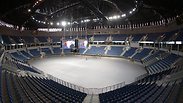
Largest sports arena in Middle East set to open in Jerusalem
The new arena, which cost more than $114 million to build, will be home to the Jerusalem basketball team, Hapoel Jerusalem and will also include an Olympic sized swimming pool, Jerusalem’s first permanent skating rink, and a bowling alley.
Just days before the Jerusalem Payis Arena is set to open, workers are drilling the blue cushioned seats into the stadium, the roof is yet to be completed and cables snake everywhere throughout the huge eight-level stadium. The project has been under construction for five years.
“This is a dream come true,” Jerusalem mayor Nir Barkat told The Media Line, standing on the main floor of the arena. “We’ve been dreaming bout such a stadium for decades. Jerusalem is now back to leading Israel as the center for culture and tourism.”
Related stories:
- Jerusalem aims to become cultural center
- Magic Johnson to visit Israel in September
- Jerusalem mayor sees vast potential in tourism
The Arena cost more than $114 million to build, two-thirds of which came from Mifal Hapayis, Israel’s national lottery. The lottery, incidentally, took in more than $1.7 billion last year. The arena can seat 11,600 people in 18 galleries and 16 VIP boxes. Including floor seating, the stadium can hold 15,000 spectators.
Until now, Jerusalem was known more for holy sites like the Western Wall, the Church of the Holy Sepulchre and the Dome of the Rock mosque. The cultural and sports capital of Israel was Tel Aviv, where Lady Gaga will perform this weekend. Many other top artists and shows, including a run by Cirque de Soleil, were cancelled due to the seven weeks of fighting between Israel and Hamas in Gaza.
Barkat said he believes the stadium is the biggest in the Middle East, although a huge monolith under construction in Qatar for the World Cup in 2022 is expected to have a capacity of 60,000 spectators.
The Payis Arena, which will also be new home of the Jerusalem basketball team, Hapoel Jerusalem, is only the first stage of the project. It will also include an Olympic sized swimming pool, Jerusalem’s first permanent skating rink, and a bowling alley. It is in southern Jerusalem, next door to Teddy Stadium, an outdoor soccer stadium named after longtime Jerusalem mayor Teddy Kollek. Nearby are the Jerusalem Biblical Zoo, and the Jerusalem mall.
Barkat said there are plans to build an extension of Jerusalem’s light rail line to the stadium encouraging spectators to arrive by public transportation rather than driving.
“Once the high-speed train is completed from Tel Aviv to Jerusalem in 2018, it will be possible to get here in 28 minutes from the center of the country,” Barkat told a news conference. “We will host the largest international sports and cultural events in the world in the capital of Israel.”
The stadium, which used 25,000 cubic meters of concrete and 3000 tons of iron to build, can be changed according to the event being held there. A parquet floor is rolled out for a basketball tournament, while a different floor can be put in place for a circus performance. It is completely handicapped-accessible, and for the next three months, the stadium is already booked more than half the time.
The mayor toured the sports arena as riots continued to grip Jerusalem following the death of a 16-year-old Palestinian boy who was shot by Israeli police last week. His family says the boy died after a rubber-coated steel bullet was shot at his head, while the police said he was shot in the leg and hit his head when he fell. Several dozen angry Palestinians burned a gas station in the French Hill neighborhood of Jerusalem, and threw rocks and Molotov cocktails at cars. They also damaged several light rail trains in east Jerusalem.
“Unfortunately we had another day of riots,” Barkat told The Media Line. “It will be dealt with by the police with a very strong hand. There’s no excuse for people taking the law into their hands, and the police with my full backing will do whatever it takes to restore law and order into the neighborhoods.”
Jerusalem’s population is about 800,000 with two-thirds of the city’s residents Jews, and one-third Palestinians. Barkat said he hoped the new stadium could contribute to Arab-Jewish coexistence in the city.
“Sports and culture are focusing on the common denominator and every time we have a sporting event – the marathon, the Formula One road show, the Peace road show – it brings people together,” Barkat said. “I expect everyone --- Jews, Christians and Muslims – to be law-abiding residents of Jerusalem.”
Article written by Linda Gradstein.
Reprinted with permission from The Media Line.










